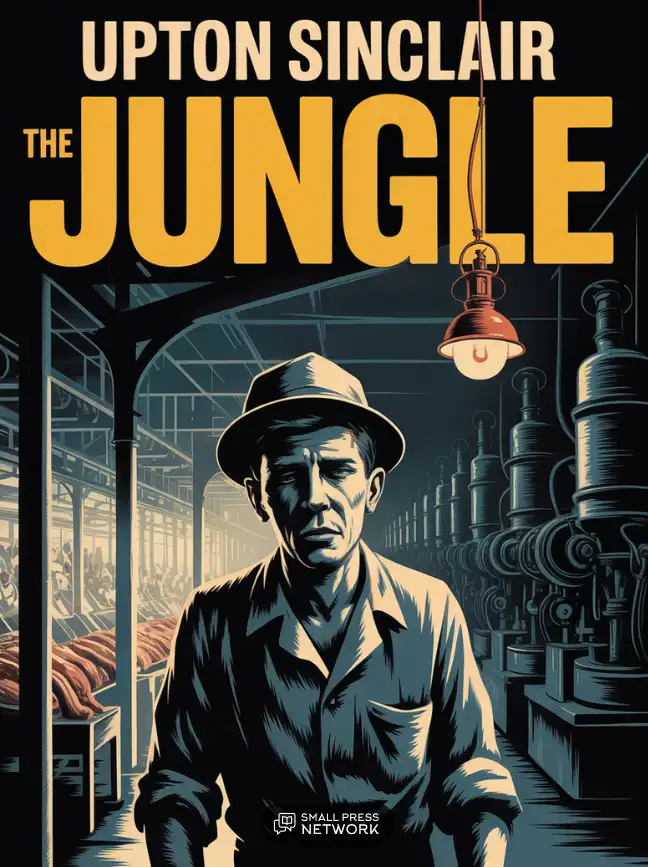C XIX
“Madame Haupt Hebamme”, ran a sign, swinging from a second- story window over a saloon on the avenue; at a side door was another sign, with a hand pointing up a dingy flight of stairs. Jurgis went up them, three at a time.
Madame Haupt was frying pork and onions, and had her door half open to let out the smoke. When he tried to knock upon it, it swung open the rest of the way, and he had a glimpse of her, with a black bottle turned up to her lips. Then he knocked louder, and she started and put it away. She was a Dutchwoman, enormously fat—when she walked she rolled like a small boat on the ocean, and the dishes in the cupboard jostled each other. She wore a filthy blue wrapper, and her teeth were black.
“Vot is it?” she said, when she saw Jurgis.
He had run like mad all the way and was so out of breath he could hardly speak. His hair was flying and his eyes wild—he looked like a man that had risen from the tomb. “My wife!” he panted. “Come quickly!” Madame Haupt set the frying pan to one side and wiped her hands on her wrapper.
“You vant me to come for a case?” she inquired.
“Yes,” gasped Jurgis.
“I haf yust come back from a case,” she said. “I haf had no time to
eat my dinner. Still—if it is so bad—”
“Yes—it is!” cried he.
“Vell, den, perhaps—vot you pay?”
“I—I—how much do you want?” Jurgis stammered.
“Tventy-five dollars.” His face fell. “I can’t pay that,” he said.
The woman was watching him narrowly. “How much do you pay?”
she demanded.
“Must I pay now—right away?”
“Yes; all my customers do.”
“I—I haven’t much money,” Jurgis began in an agony of dread.
“I’ve been in—in trouble—and my money is gone. But I’ll pay you— every cent—just as soon as I can; I can work—”
“Vot is your work?”
“I have no place now. I must get one. But I—”
“How much haf you got now?”
He could hardly bring himself to reply. When he said “A dollar and a quarter,” the woman laughed in his face.
“I vould not put on my hat for a dollar and a quarter,” she said.
“It’s all I’ve got,” he pleaded, his voice breaking. “I must get some one—my wife will die. I can’t help it—I—”
Madame Haupt had put back her pork and onions on the stove.
She turned to him and answered, out of the steam and noise: “Git me ten dollars cash, und so you can pay me the rest next mont’.”
“I can’t do it—I haven’t got it!” Jurgis protested. “I tell you I have only a dollar and a quarter.”
The woman turned to her work. “I don’t believe you,” she said.
“Dot is all to try to sheat me. Vot is de reason a big man like you has got only a dollar und a quarter?”
“I’ve just been in jail,” Jurgis cried—he was ready to get down upon his knees to the woman—“and I had no money before, and my family has almost starved.”
“Vere is your friends, dot ought to help you?”
“They are all poor,” he answered. “They gave me this. I have done
everything I can—”
“Haven’t you got notting you can sell?”
“I have nothing, I tell you—I have nothing,” he cried, frantically.
“Can’t you borrow it, den? Don’t your store people trust you?”
Then, as he shook his head, she went on: “Listen to me—if you git me you vill be glad of it. I vill save your wife und baby for you, and it vill not seem like mooch to you in de end. If you loose dem now how you tink you feel den? Und here is a lady dot knows her business—I could send you to people in dis block, und dey vould tell you—”
Madame Haupt was pointing her cooking-fork at Jurgis persuasively; but her words were more than he could bear. He flung up his hands with a gesture of despair and turned and started away.
“It’s no use,” he exclaimed—but suddenly he heard the woman’s
voice behind him again—
“I vill make it five dollars for you.”
She followed behind him, arguing with him. “You vill be foolish not to take such an offer,” she said. “You von’t find nobody go out on a rainy day like dis for less. Vy, I haf never took a case in my life so sheap as dot. I couldn’t pay mine room rent—”
Jurgis interrupted her with an oath of rage. “If I haven’t got it,” he shouted, “how can I pay it? Damn it, I would pay you if I could, but I tell you I haven’t got it. I haven’t got it! Do you hear me—I haven’t got it!”
He turned and started away again. He was halfway down the stairs before Madame Haupt could shout to him: “Vait! I vill go mit
you! Come back!”
He went back into the room again.
“It is not goot to tink of anybody suffering,” she said, in a melancholy voice. “I might as vell go mit you for noffing as vot you offer me, but I vill try to help you. How far is it?”
“Three or four blocks from here.”
“Tree or four! Und so I shall get soaked! Gott in Himmel, it ought to be vorth more! Vun dollar und a quarter, und a day like dis!—But you understand now—you vill pay me de rest of twenty-five dollars
soon?”
“As soon as I can.”
“Some time dis mont’?”
“Yes, within a month,” said poor Jurgis. “Anything! Hurry up!”
“Vere is de dollar und a quarter?” persisted Madame Haupt, relentlessly.
Jurgis put the money on the table and the woman counted it and stowed it away. Then she wiped her greasy hands again and proceeded to get ready, complaining all the time; she was so fat that it was painful for her to move, and she grunted and gasped at every step. She took off her wrapper without even taking the trouble to turn her back to Jurgis, and put on her corsets and dress. Then there was
a black bonnet which had to be adjusted carefully, and an umbrella which was mislaid, and a bag full of necessaries which had to be collected from here and there—the man being nearly crazy with anxiety in the meantime. When they were on the street he kept about four paces ahead of her, turning now and then, as if he could hurry her on by the force of his desire. But Madame Haupt could only go so far at a step, and it took all her attention to get the needed breath for that.
They came at last to the house, and to the group of frightened women in the kitchen. It was not over yet, Jurgis learned—he heard Ona crying still; and meantime Madame Haupt removed her bonnet and laid it on the mantelpiece, and got out of her bag, first an old dress and then a saucer of goose grease, which she proceeded to rub upon her hands. The more cases this goose grease is used in, the better luck it brings to the midwife, and so she keeps it upon her kitchen mantelpiece or stowed away in a cupboard with her dirty clothes, for months, and sometimes even for years.
Then they escorted her to the ladder, and Jurgis heard her give an exclamation of dismay. “Gott in Himmel, vot for haf you brought me to a place like dis? I could not climb up dot ladder. I could not git troo a trap door! I vill not try it—vy, I might kill myself already. Vot sort of a place is dot for a woman to bear a child in—up in a garret, mit only a ladder to it? You ought to be ashamed of yourselves!” Jurgis stood in the doorway and listened to her scolding, half drowning out the horrible moans and screams of Ona.
At last Aniele succeeded in pacifying her, and she essayed the ascent; then, however, she had to be stopped while the old woman cautioned her about the floor of the garret. They had no real floor— they had laid old boards in one part to make a place for the family to live; it was all right and safe there, but the other part of the garret had only the joists of the floor, and the lath and plaster of the ceiling below, and if one stepped on this there would be a catastrophe. As it was half dark up above, perhaps one of the others had best go up first with a candle. Then there were more outcries and threatening, until at last Jurgis had a vision of a pair of elephantine legs disappearing through the trap door, and felt the house shake as
Madame Haupt started to walk. Then suddenly Aniele came to him and took him by the arm.
“Now,” she said, “you go away. Do as I tell you—you have done all you can, and you are only in the way. Go away and stay away.”
“But where shall I go?” Jurgis asked, helplessly.
“I don’t know where,” she answered. “Go on the street, if there is no other place—only go! And stay all night!”
In the end she and Marija pushed him out of the door and shut it behind him. It was just about sundown, and it was turning cold—the rain had changed to snow, and the slush was freezing. Jurgis shivered in his thin clothing, and put his hands into his pockets and started away. He had not eaten since morning, and he felt weak and ill; with a sudden throb of hope he recollected he was only a few blocks from the saloon where he had been wont to eat his dinner.
They might have mercy on him there, or he might meet a friend. He set out for the place as fast as he could walk.
“Hello, Jack,” said the saloon-keeper, when he entered—they call all foreigners and unskilled men “Jack” in Packingtown. “Where’ve you been?”
Jurgis went straight to the bar. “I’ve been in jail,” he said, “and I’ve just got out. I walked home all the way, and I’ve not a cent, and had nothing to eat since this morning. And I’ve lost my home, and my wife’s ill, and I’m done up.”
The saloon-keeper gazed at him, with his haggard white face and his blue trembling lips. Then he pushed a big bottle toward him. “Fill her up!” he said.
Jurgis could hardly hold the bottle, his hands shook so.
“Don’t be afraid,” said the saloon-keeper, “fill her up!”
So Jurgis drank a large glass of whisky, and then turned to the lunch counter, in obedience to the other’s suggestion. He ate all he dared, stuffing it in as fast as he could; and then, after trying to speak his gratitude, he went and sat down by the big red stove in the middle of the room.
It was too good to last, however—like all things in this hard world.
His soaked clothing began to steam, and the horrible stench of fertilizer to fill the room. In an hour or so the packing houses would be closing and the men coming in from their work; and they would
not come into a place that smelt of Jurgis. Also it was Saturday night, and in a couple of hours would come a violin and a cornet, and in the rear part of the saloon the families of the neighborhood would dance and feast upon wienerwurst and lager, until two or three o’clock in the morning. The saloon-keeper coughed once or twice, and then remarked, “Say, Jack, I’m afraid you’ll have to quit.”
He was used to the sight of human wrecks, this saloon-keeper; he “fired” dozens of them every night, just as haggard and cold and forlorn as this one. But they were all men who had given up and been counted out, while Jurgis was still in the fight, and had reminders of decency about him. As he got up meekly, the other reflected that he had always been a steady man, and might soon be a good customer again. “You’ve been up against it, I see,” he said.
“Come this way.”
In the rear of the saloon were the cellar stairs. There was a door above and another below, both safely padlocked, making the stairs an admirable place to stow away a customer who might still chance to have money, or a political light whom it was not advisable to kick out of doors.
So Jurgis spent the night. The whisky had only half warmed him, and he could not sleep, exhausted as he was; he would nod forward, and then start up, shivering with the cold, and begin to remember again. Hour after hour passed, until he could only persuade himself that it was not morning by the sounds of music and laughter and singing that were to be heard from the room. When at last these ceased, he expected that he would be turned out into the street; as this did not happen, he fell to wondering whether the man had forgotten him.
In the end, when the silence and suspense were no longer to be borne, he got up and hammered on the door; and the proprietor came, yawning and rubbing his eyes. He was keeping open all night, and dozing between customers.
“I want to go home,” Jurgis said. “I’m worried about my wife—I can’t wait any longer.”
“Why the hell didn’t you say so before?” said the man. “I thought you didn’t have any home to go to.” Jurgis went outside. It was four o’clock in the morning, and as black as night. There were three or
four inches of fresh snow on the ground, and the flakes were falling thick and fast. He turned toward Aniele’s and started at a run.
There was a light burning in the kitchen window and the blinds were drawn. The door was unlocked and Jurgis rushed in.
Aniele, Marija, and the rest of the women were huddled about the stove, exactly as before; with them were several newcomers, Jurgis noticed—also he noticed that the house was silent.
“Well?” he said.
No one answered him, they sat staring at him with their pale faces.
He cried again: “Well?”
And then, by the light of the smoky lamp, he saw Marija who sat nearest him, shaking her head slowly. “Not yet,” she said.
And Jurgis gave a cry of dismay. “Not yet?”
Again Marija’s head shook. The poor fellow stood dumfounded. “I don’t hear her,” he gasped.
“She’s been quiet a long time,” replied the other.
There was another pause—broken suddenly by a voice from the attic: “Hello, there!”
Several of the women ran into the next room, while Marija sprang toward Jurgis. “Wait here!” she cried, and the two stood, pale and trembling, listening. In a few moments it became clear that Madame Haupt was engaged in descending the ladder, scolding and exhorting again, while the ladder creaked in protest. In a moment or two she reached the ground, angry and breathless, and they heard her coming into the room. Jurgis gave one glance at her, and then turned white and reeled. She had her jacket off, like one of the workers on the killing beds. Her hands and arms were smeared with blood, and blood was splashed upon her clothing and her face.
She stood breathing hard, and gazing about her; no one made a sound. “I haf done my best,” she began suddenly. “I can do noffing
more—dere is no use to try.”
Again there was silence.
“It ain’t my fault,” she said. “You had ought to haf had a doctor, und not vaited so long—it vas too late already ven I come.” Once more there was deathlike stillness. Marija was clutching Jurgis with all the power of her one well arm.
Then suddenly Madame Haupt turned to Aniele. “You haf not got something to drink, hey?” she queried. “Some brandy?”
Aniele shook her head.
“Herr Gott!” exclaimed Madame Haupt. “Such people! Perhaps you vill give me someting to eat den—I haf had noffing since yesterday morning, und I haf vorked myself near to death here. If I could haf known it vas like dis, I vould never haf come for such money as you gif me.” At this moment she chanced to look round, and saw Jurgis: She shook her finger at him. “You understand me,” she said, “you pays me dot money yust de same! It is not my fault dat you send for me so late I can’t help your vife. It is not my fault if der baby comes mit one arm first, so dot I can’t save it. I haf tried all night, und in dot place vere it is not fit for dogs to be born, und mit notting to eat only vot I brings in mine own pockets.”
Here Madame Haupt paused for a moment to get her breath; and Marija, seeing the beads of sweat on Jurgis’s forehead, and feeling the quivering of his frame, broke out in a low voice: “How is Ona?”
“How is she?” echoed Madame Haupt. “How do you tink she can be ven you leave her to kill herself so? I told dem dot ven they send for de priest. She is young, und she might haf got over it, und been vell und strong, if she had been treated right. She fight hard, dot girl —she is not yet quite dead.”
And Jurgis gave a frantic scream. “Dead!”
“She vill die, of course,” said the other angrily. “Der baby is dead now.”
The garret was lighted by a candle stuck upon a board; it had almost burned itself out, and was sputtering and smoking as Jurgis rushed up the ladder. He could make out dimly in one corner a pallet of rags and old blankets, spread upon the floor; at the foot of it was a crucifix, and near it a priest muttering a prayer. In a far corner crouched Elzbieta, moaning and wailing. Upon the pallet lay Ona.
She was covered with a blanket, but he could see her shoulders and one arm lying bare; she was so shrunken he would scarcely have known her—she was all but a skeleton, and as white as a piece of chalk. Her eyelids were closed, and she lay still as death. He staggered toward her and fell upon his knees with a cry of anguish: “Ona! Ona!”
She did not stir. He caught her hand in his, and began to clasp it frantically, calling: “Look at me! Answer me! It is Jurgis come back— don’t you hear me?”
There was the faintest quivering of the eyelids, and he called again in frenzy: “Ona! Ona!”
Then suddenly her eyes opened one instant. One instant she looked at him—there was a flash of recognition between them, he saw her afar off, as through a dim vista, standing forlorn. He stretched out his arms to her, he called her in wild despair; a fearful yearning surged up in him, hunger for her that was agony, desire that was a new being born within him, tearing his heartstrings, torturing him. But it was all in vain—she faded from him, she slipped back and was gone. And a wail of anguish burst from him, great sobs shook all his frame, and hot tears ran down his cheeks and fell upon her. He clutched her hands, he shook her, he caught her in his arms and pressed her to him but she lay cold and still—she was gone—she was gone!
The word rang through him like the sound of a bell, echoing in the far depths of him, making forgotten chords to vibrate, old shadowy fears to stir—fears of the dark, fears of the void, fears of annihilation.
She was dead! She was dead! He would never see her again, never hear her again! An icy horror of loneliness seized him; he saw himself standing apart and watching all the world fade away from him—a world of shadows, of fickle dreams. He was like a little child, in his fright and grief; he called and called, and got no answer, and his cries of despair echoed through the house, making the women downstairs draw nearer to each other in fear. He was inconsolable, beside himself—the priest came and laid his hand upon his shoulder and whispered to him, but he heard not a sound. He was gone away himself, stumbling through the shadows, and groping after the soul that had fled.
So he lay. The gray dawn came up and crept into the attic. The priest left, the women left, and he was alone with the still, white figure—quieter now, but moaning and shuddering, wrestling with the grisly fiend. Now and then he would raise himself and stare at the white mask before him, then hide his eyes because he could not bear it. Dead! dead! And she was only a girl, she was barely
eighteen! Her life had hardly begun—and here she lay murdered— mangled, tortured to death!
It was morning when he rose up and came down into the kitchen— haggard and ashen gray, reeling and dazed. More of the neighbors had come in, and they stared at him in silence as he sank down upon a chair by the table and buried his face in his arms.
A few minutes later the front door opened; a blast of cold and snow rushed in, and behind it little Kotrina, breathless from running, and blue with the cold. “I’m home again!” she exclaimed. “I could hardly—”
And then, seeing Jurgis, she stopped with an exclamation.
Looking from one to another she saw that something had happened, and she asked, in a lower voice: “What’s the matter?”
Before anyone could reply, Jurgis started up; he went toward her, walking unsteadily. “Where have you been?” he demanded.
“Selling papers with the boys,” she said. “The snow—”
“Have you any money?” he demanded.
“Yes.”
“How much?”
“Nearly three dollars, Jurgis.”
“Give it to me.”
Kotrina, frightened by his manner, glanced at the others. “Give it to me!” he commanded again, and she put her hand into her pocket and pulled out a lump of coins tied in a bit of rag. Jurgis took it without a word, and went out of the door and down the street.
Three doors away was a saloon. “Whisky,” he said, as he entered, and as the man pushed him some, he tore at the rag with his teeth and pulled out half a dollar. “How much is the bottle?” he said. “I want to get drunk.”




